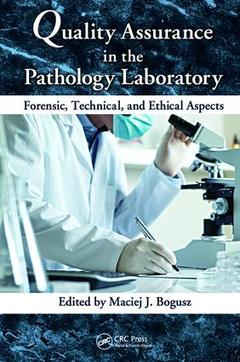Description
Quality Assurance in the Pathology Laboratory
Forensic, Technical, and Ethical Aspects
Coordinator: Bogusz Maciej J.
Language: English
Subjects for Quality Assurance in the Pathology Laboratory:
Keywords
Laboratory Medicine; Forensic Toxicology; Total Testing Process; Preanalytical Phase; Point Of Care Testing; Prociency Testing; EQA Program; Clinical Chemistry; Certied Reference Materials; Combined Uncertainty; EQA; IFCC; MRM Mode; IUPAC Technical Report; Preanalytical Errors; CY P2; Quality Control Plan; Preanalytical Variability; Forensic Autopsy; Target SD; Ph Ar; Postmortem Biopsies; Optical Surface Scanning; Laboratory Accreditation; GC MS Screening
Publication date: 09-2017
· 15.6x23.4 cm · Paperback
Publication date: 02-2011
300 p. · 15.6x23.4 cm · Hardback
Description
/li>Contents
/li>Readership
/li>Biography
/li>
Quality refers to the amount of the unpriced attributes contained in each unit of the priced attribute.
Leffler, 1982
Quality is neither mind nor matter, but a third entity independent of the two, even though Quality cannot be defined, you know what it is.
Pirsig, 2000
The continuous formulation of good practices and procedures across fields reflects the importance of the recognition and maintenance of "quality" for nearly every profession. The widespread introduction of point-of-care testing, centralization of activities in large core laboratories, and the increase in number and complexity of diagnostic testing worldwide has driven changes in the organization of laboratory diagnostics over the past decades. As such, laboratory diagnostics, continuously catching up to updated techniques and complex procedures, need to stay vigilant about safety and good practices adjustments.
Although widely defined and quantified, the concept of quality is an intrinsic feature of the human psyche and decision making. Written to improve laboratory work, Quality Assurance in the Pathology Laboratory examines:
- Quality assurance of quantifiable methods applied in laboratory medicine and toxicology
- Quality aspects of emerging disciplines including personalized therapy and virtopsy
- Regulatory and logistic instrumentation that ensure quality in laboratory methods
- Professional education at the graduate and postgraduate levels
Laboratory diagnostics substantially contributes to clinical decision making by providing valuable information for the screening, diagnosis, therapeutic monitoring, and follow-up of most?if not all?human disorders. Providing general insights into the quality assurance aspects of pathology and laboratory medicine, this book aids in improving laboratory work and, at the same time, shows the possibilities and limits of all logistic and legal tools related to quality issues.
QUALITY ASSURANCE OF CHEMOMETRIC METHODS AND PATHOLOGY: SELECTED TOPICS: The Preanalytical Phase in Quality Assurance. Quality Assurance of Point of Care and On-Site Drug Testing. Quality Assurance of Identification with Chromatographic-Mass Spectrometric Methods. Quality Assurance of Quantification using Chromatographic methods with linear relation between dose and detector response. Pharmacogenomics, Personalized Medicine and Personalized Justice Influencing the Quality and Practice of Forensic Science. ACCREDITATION, STANDARDS, AND EDUCATION: THE HUMAN FACTOR: Role of Accreditation Procedures in Maintaining of Quality. Role of Governmental and Professional Organizations in Setting of Quality Standards in Pathology and Laboratory Medicine and Related Areas. Education and Training in the Changing Environment of Pathology and Laboratory Medicine. Quality Assurance Aspects of Interpretation of Results in Clinical and Forensic Toxicology.
Maciej J. Bogusz is currently a senior clinical scientist at the Royal Clinic in Riyadh, Saudi Arabia. His scientific interests include the pharmacology and toxicology of illicit drugs and their active metabolites, and the application of modern analytical methods (particularly liquid chromatography-mass spectrometry [LC-MS]) in clinical and forensic toxicology. He is an internationally recognized expert in this area. Dr. Bogusz has additionally performed several studies on the toxicological aspects of herbal remedies. Recently, he developed several methods concerning therapeutic drug monitoring of clinically relevant drugs (i.e., immunosuppressants) using LC-MS-MS.
Dr. Bogusz graduated as a physician from Copernicus University School of Medicine in Krakow, Poland, in 1963. In his professional career, he was a research scientist at the Institute of Forensic Research in Krakow and chief toxicologist at the Institute of Forensic Medicine in Krakow. He was board certified in clinical chemistry and forensic medicine in Poland. Since 1986, he has been working in Germany as a privatdozent at the Institute of Legal Medicine at the Ruprecht-Karl University of Heidelberg. He is a diplomate of the German Board of Forensic Toxicologists. From 1990 until 2000, he worked at the Institute of Forensic Medicine at the Aachen University of Technology (RWTH). In 2000, he joined the Toxicology Laboratory at the King Faisal Specialist Hospital and Research Centre in Riyadh, and later the Royal Laboratory.




